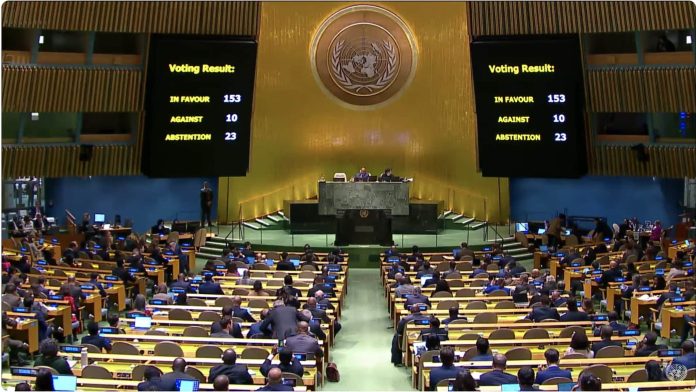On Tuesday, the United Nations General Assembly resoundingly passed a resolution, supported by a substantial majority, that called for an ‘immediate humanitarian ceasefire’ and the ‘unconditional release of all hostages.’ In this vote, the European Union displayed a higher level of unity than its previous stance on the Gaza situation despite some opposing voices.
The Resolution secured overwhelming support with 153 votes in favour, alongside ten against and 23 abstentions.
Majority Support for the Resolution Among EU Member States
Of the 27 European Union (EU) member states, two — Austria and the Czech Republic — voted against the Resolution. Seventeen members voted in favour, forming a majority, while the remaining eight abstained.
During the adoption of an earlier resolution on 27 October, which advocated for a ‘truce’ instead of a ceasefire, the European Union (EU) was noticeably more divided. At that time, eight EU member states voted in favour of the Resolution, four opposed it, and 15 chose to abstain.
Ambassador Alexander Marshik, representing Austria, one of the two EU countries to oppose the latest Resolution, felt that “This resolution falls short in many ways, including the right of Israel to ensure its citizens are safe and naming the terrorist group in taking of hostages,” Austria had proposed an amendment to the text which failed to garner the necessary two-thirds majority and was rejected.
| Country | 12 December 2023 Resolution | 27 October 2023 Resolution |
|---|---|---|
| Austria | Against | Against |
| Belgium | For | For |
| Bulgaria | Abstained | Abstained |
| Croatia | For | Against |
| Cyprus | For | Abstained |
| Czech Republic | Against | Against |
| Denmark | For | Abstained |
| Estonia | For | Abstained |
| Finland | For | Abstained |
| France | For | For |
| Germany | Abstained | Abstained |
| Greece | For | Abstained |
| Hungary | Abstained | Against |
| Ireland | For | For |
| Italy | Abstained | Abstained |
| Latvia | For | Abstained |
| Lithuania | Abstained | Abstained |
| Luxembourg | For | For |
| Malta | For | For |
| Netherlands | Abstained | Abstained |
| Poland | For | Abstained |
| Portugal | For | For |
| Romania | Abstained | Abstained |
| Slovakia | Abstained | Abstained |
| Slovenia | For | For |
| Spain | For | For |
| Sweden | For | Abstained |
Increased Support in the Face of Humanitarian Collapse
After over two months of Israeli reprisals in response to Hamas’s bloody attack on 7 October, a growing number of countries are supporting calls for a ceasefire.
The recent General Assembly resolution garnered more support than the previous one, with 153 votes in favour, an increase of 33 votes. Meanwhile, opposition decreased by four votes, and abstentions reduced from 45 to 23.
A critical factor in this shift is the worsening living conditions in the Gaza Strip.
Tuesday, the European Union’s EU foreign affairs chief, Josep Borrell, described the situation in Gaza as “apocalyptic” and compared the impact of the bombings to those suffered by Germany during the Second World War. “The destruction of buildings in Gaza which is more or less – or even greater – than the destruction suffered by the German cities during the Second World War,” he stated following a meeting of EU foreign ministers in Brussels.
The conflict has led to at least 18,000 deaths according to the Ministry of Health in Gaza, predominantly women and children, and displaced 1.9 million people. As the bombings intensify, UN agencies have warned that the distribution of humanitarian aid is compromised.
The UN Secretary-General had warned of a “humanitarian collapse.”
António Guterres had invoked Article 99 to request the Security Council to meet urgently. However, on 8 December, the Resolution presented to the Council was rejected after the United States vetoed it. The head of the UN has promised that he would “never give up.”




